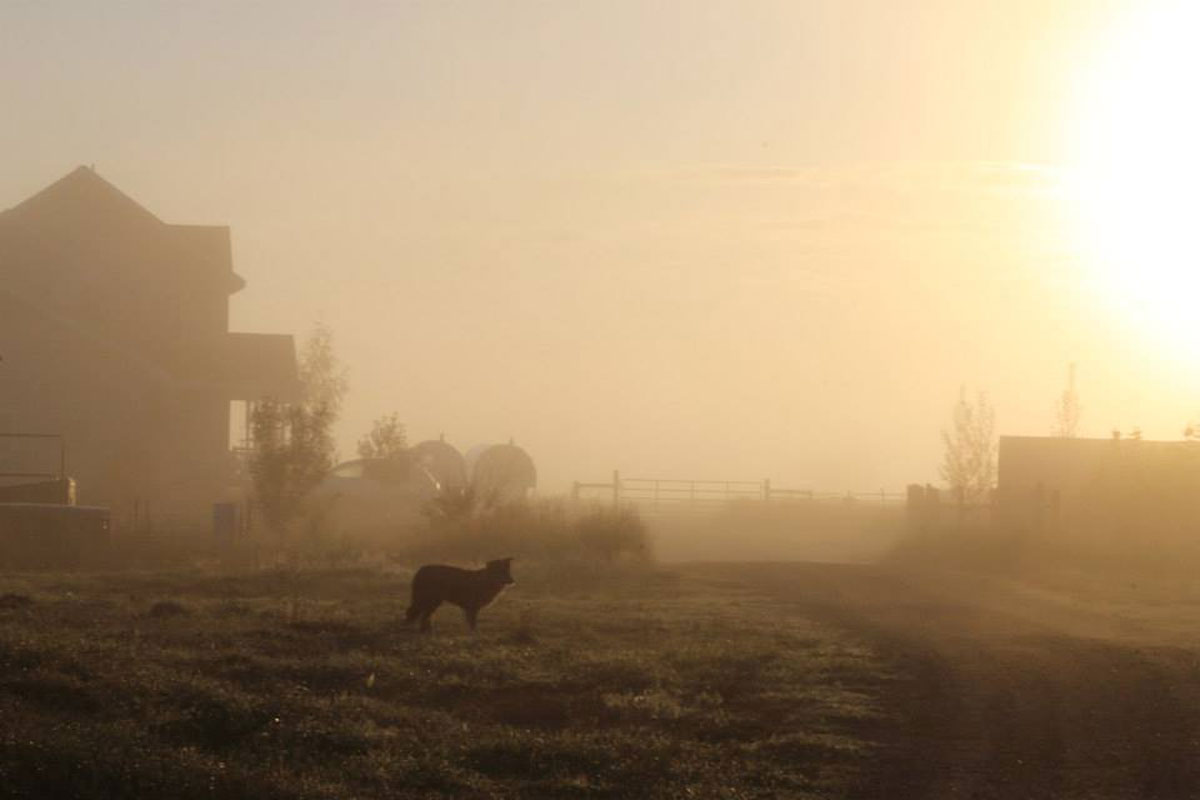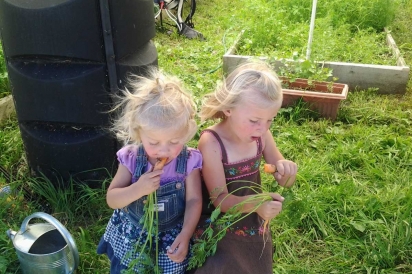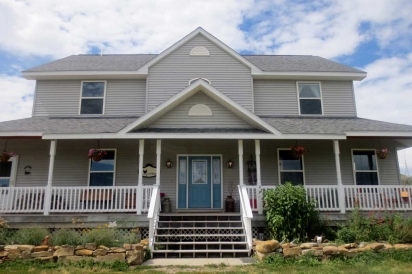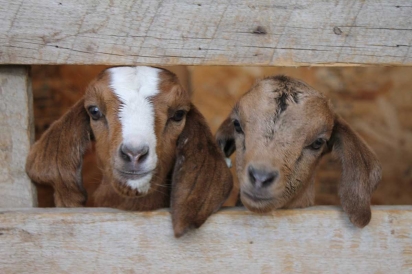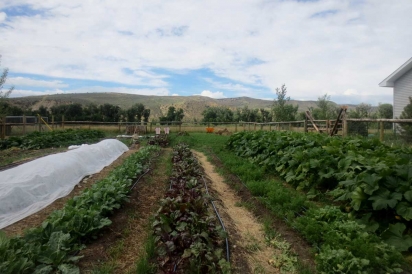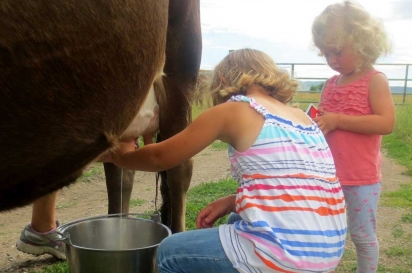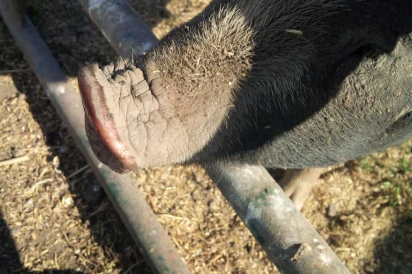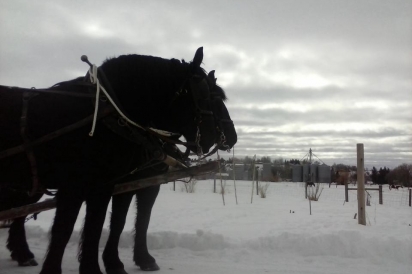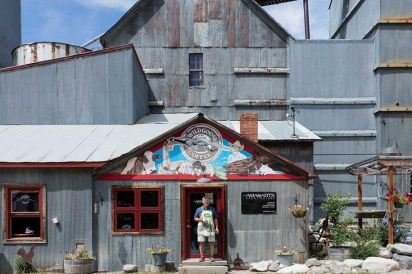An Agritourism Escape to Hayden, Colorado
Despite living in Colorado off-and-on since 1995, I’d never heard of Hayden- a former coal mining town 22 miles west of Steamboat Springs - until a month ago. That’s when an acquaintance told me about the Horse & Hen Inn, a farmstay located on a fourth-generation working ranch. Given my love of agritourism, it wasn’t a hard sell for me to make the three-hour drive from Basalt, especially since Highway 13 and 40 are so scenic. It makes for an ideal summer or fall road trip, minus the mayhem of I-70E.
Agriculture has also long been a part of Hayden’s history, and farming and cattle ranching still form the basis of its economy. Some residents, like Horse & Hen’s Ryan Wattles, 32, carry on the family legacy. Ryan’s great-grandparents Charlie and Peroda Fulton first came to the region at the turn of the century, when they established a homestead north of town.
In 1934, the Fulton family bought a 100-acre namesake ranch along the Yampa River. One of their sons, Chuck, purchased the property and continued raising cattle and sheep, relying on his team of draft horses to cultivate the pastures and feed the livestock (in winter, he used a sleigh). The ranch has stayed in the family and is now home to fourth and fifth generations Ryan, his wife Rachel, 32, and their daughters, Sydney, five, and Lucy, two-and-a-half; the couple will welcome twins in December.
Ryan and Rachel met as teenagers attending high school in Steamboat. Ryan had grown up working on his grandparents’ ranch driving a team, haying, and docking sheep from the time he was a kid. Rachel’s grandparents owned a fruit orchard in Cedaredge, and from them she inherited a desire to live off the land.
If you believe in fate, the genial young couple were clearly meant to carry on family traditions. After Ryan completed a stint in the army that included tours of Afghanistan and Iraq, he went to CSU to study Rangeland Management. In 2010, they moved back to Hayden with six-week-old Sydney to take over management of the ranch.
Explains Ryan, “We didn’t really have a plan at the time, but we knew this would be a great place to raise kids and we were ready to put down roots.” Adds Rachel, “Ranching is in Ryan’s blood, and he has a set of skills that are a dying tradition, especially amongst his generation. For me, it was like having a second childhood, because I lived in the suburbs of Denver until I moved to Steamboat at 16.”
Education is a major reason the Wattles’ decided to turn the former main house into a farmstay. “It was too much space for us,” explains Rachel. “We moved into Chuck’s house, and converted the main dwelling into a guest property in 2014. There are four rooms [a King, two Queens, and one room with two twin beds from $109/night; the entire house is $400/night], so it provides extra income, but it’s also about sharing our life with others, especially kids. It’s been so healthy and fulfilling for us, and having families from the city visit is so great. The kids make it okay for the parents to be interested, and they’ll all pitch in with the farm chores, from feeding the pigs, gathering eggs, and working in the garden and greenhouse, to milking. When it’s all adults staying here, there can be a lot of inhibition.”
Rachel’s comments reflect what I love best about Horse & Hen. Too often, “farmstays” are a marketing term that refers to a rural property with no actual farming taking place. Not every guest wants to get their hands dirty, but for those genuinely interested in learning where their food comes from, Horse & Hen is the real deal. Even for someone like myself who grew up on a ranch, it’s a treat to pitch in, interact with the animals (which include pasture-raised Berkshire pigs, horses, Boer goats, beef cattle, chickens, dogs, and Norma, a Jersey-Normande dairy cow and her calf, Boo), and eat food sourced on-site.
The other thing that makes Horse & Hen special are its connections to the community. The Wattles’ have a CSA, Hayden Roots, with their neighbors, J.R. Lott and Patrick and Tammie Delaney of Diamond O Ranch. The Delaney’s also own and run Wild Goose Coffee, located across the pasture from Horse & Hen in the historic Hayden Granary. The forthcoming Yampa Valley Brewing Company, located in a warehouse around the corner from the granary, supplies the Wattles’ with spent mash, which they feed to their pigs. The farmstead bacon enjoyed by guests at breakfast is made by Brother’s Custom Processing in Craig.
Even if you’re pitching in, a stay at Horse & Hen is leisurely. Following an 8 a.m. breakfast prepared by Rachel—a soft veggie scramble made with eggs I’d helped her collect the previous evening—the aforementioned bacon, and a postively addictive coffee cake (recipe below), I helped Ryan with the chores. I used to raise dairy goats, but warned him my milking skills were more than a little rusty. No problem, because Lucy and her four-year-old cousin Camble stepped in and put me to shame.
One of the most interesting aspects of Horse & Hen is Ryan’s passion for team-driving. A lifelong lover of equines, he’s one of a small number of modern U.S. agriculturalists who rely on animal-power to get the farm work done.
“It’s so much cheaper to have horses,” he explains. “The cost of tractor maintenance and fuel is astronomical, and when it’s 40-below outside, horses start up just fine.” Tractors also get stuck in deep snow, necessitating the use of a single feeding route, which compacts the soil. “With a team, you’re able to feed in different locations, which means the livestock aren’t eating off of their own manure,” says Ryan. “It also helps spread fertilizer and thus grass seed, and while time-consuming, it’s so much more enjoyable. We’re also able to feed as a family using the team, which isn’t something we can do with a tractor. Even if I’m working alone, though, it’s like a morning meditation for me.”
Before departing Hayden, I stopped by Wild Goose to fuel up on caffeine. Tammie Delaney told me that since 1917, the granary has been gathering place for locals; in 2013, sensing a niche, she and Patrick converted the feed store to a coffee house/gallery. Now, instead of sheep dip and hay, folks come for the delectable house-baked pastries (on my visit, it was a sour cherry tart made from the Delaney’s tree) and coffee drinks, but the sense of community is stronger than ever, Tammie says. More proof that Hayden is taking its agricultural heritage into the 21st century.
Want that coffee cake recipe from The Pioneer Woman blog? It’s right here.


